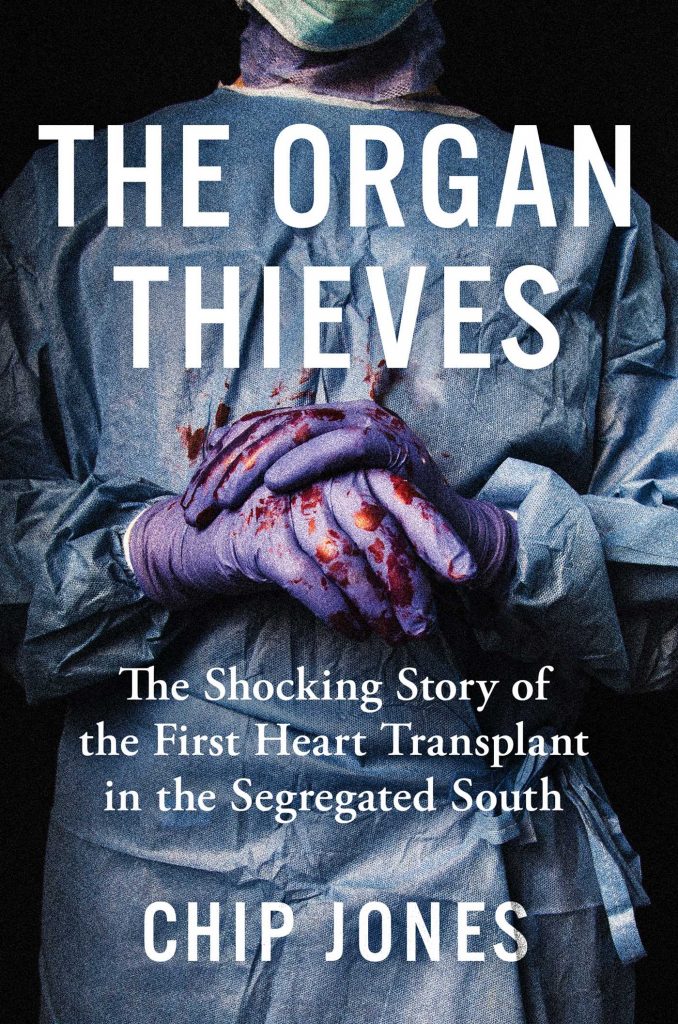In 1968, two doctors at the Medical College of Virginia performed one of the first heart transplants in the United States—unbeknowst to the man whose heart was transplanted. In The Organ Thieves: The Shocking Story of the First Heart Transplant in the Segregated South, journalist Chip Jones peels back the layers of the entire saga, documenting the uncontested power of the “gods in white coats” and the decades of ignoring—and exploiting—Black Virginians. Jones will discuss his work, along with two other panelists, at the book fest’s Fighting for Justice: When Our Institutions Do Not Serve event.
The Organ Thieves opens with Richmond attorney L. Douglas Wilder (who later became Virginia’s first Black governor) being hired by William Tucker to find out why the body of his brother Bruce, who had gone to the MCV emergency room with a head injury that proved fatal, was missing his heart. From there, Jones unravels how white privilege, human hubris, and Virginia’s long history of using Black bodies for “scientific advancement” ignored one man’s rights and his family’s heartbreak. The story sheds light on why many in the Black community today still distrust the white medical establishment. “This is a book about ethics,” says Jones, “and about how there has to be someone who says, ‘No, this is wrong.’”
The session’s moderator, Kristen Green, has examined injustice with both a reporter’s clarity and a personal perspective: Her book, Something Must Be Done About Prince Edward County, recounts how the Virginia community where Green grew up closed its public schools to avoid desegregating them.
Dr. Benjamin Gilmer took on injustice himself, and the story of that battle enthralled more than 15 million listeners on a recent episode of NPR’s “This American Life.” In his book The Other Dr. Gilmer: Two Men, A Murder, and an Unlikely Fight for Justice, two coincidences—Gilmer’s last name and his training in neurobiology—lead him into a 12-year fight to right the wrongs done to one man by the justice system, the prison system, and our society’s misunderstanding of mental illness.
When a small North Carolina family practice hired Gilmer to replace Dr. Vince Gilmer (imprisoned after confessing to a gruesome patricide), he found a community still confused by the inexplicable actions of a man they had respected. Ben suspected Vince might have been misdiagnosed and sent to prison rather than to psychiatric care, and once experts confirmed Ben’s suspicions, he found our institutions—and the people who run them—were reluctant to correct their mistakes.
“I didn’t understand these institutions [when I first got involved],” Ben says. “Law enforcement and the incarceration system are designed to punish, not to treat.” He says once Vince was correctly diagnosed, “I was naively hopeful to have the [prison] sentence reversed—and the exact opposite happened.” It took 10 years, with the help of NPR journalist Sarah Koenig, and this book to get Vince transferred to a psychiatric facility for treatment.
Why would Ben Gilmer take up the fight for a man he didn’t know and had never met? He cites his upbringing, his stint as a Schweitzer fellow in West Africa, and his commitment as a physician. More simply, once he was drawn in, he says, “I couldn’t just walk away.”


